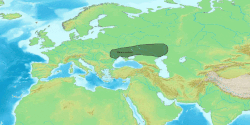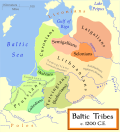List of ancient Baltic peoples and tribes
 From Wikipedia - Reading time: 13 min
From Wikipedia - Reading time: 13 min
| Part of a series on |
| Indo-European topics |
|---|
 |
|
|
The following is a list of ancient Baltic peoples and tribes.
Background
[edit]This is a list of the ancient Baltic peoples and tribes. They spoke the Baltic languages (members of the broader Balto-Slavic), a branch of the Indo-European language family, which was originally spoken by tribes living in area east of Jutland peninsula, southern Baltic Sea coast in the west and Moscow, Oka and Volga rivers basins in the east, to the northwest of the Eurasian steppe. Modern descendants are the Lithuanians and Latvians (they themselves were Finnic speakers that assimilated into other Baltic tribes).
List of ancient Baltic peoples and tribes (table)
[edit]†Extinct
Ancestors
[edit]
- Proto-Indo-Europeans (Proto-Indo-European speakers)
- Proto-Balto-Slavs (common ancestors of Balts and so called Scythian Farmers) (Proto-Balto-Slavic speakers)
- Proto-Balts (Proto-Baltic speakers)
- Proto-Balto-Slavs (common ancestors of Balts and so called Scythian Farmers) (Proto-Balto-Slavic speakers)
List of Ancient Baltic peoples and tribes (kinship tree)
[edit]

Sambian-Nothangian group
Western Masurian group (Galindians?)
Eastern Masurian group (Yotvingians)
Lower Neman and West-Latvian group (Curonians)
Plain-Pottery culture, AKA Dnepr-Dvina culture
Bell-shaped burials group




- Western Balts
- Neuri / Navari (a people mentioned by Herodotus) - later known as Sūdavi(swamp dwellers) that lived along Narew river. Also known as Yotvingians(viking given name) - there are many other names, that they were known for - like Dainavi, Polexians and Berestians(around Brest in Belarus). Sūdavi seems to have inhabited quite large area - from Suvalkia to Volinia and whole western part of modern Belarus, including lands where kingdom of Lithuania was established(whole southern part of Lithuania).
- Galindians
- Aestii
- Prussians (Old Prussians, Baltic Prussians) (Prūsai) (they lived in Prussia, Old Prussia or Baltic Prussia).
- Scalovians (Skallawai) (they lived in Scalovia — Skallawa). Distinct ethnic people, closely related to both Curonians and Prussians.
- Curonians or Kūri (they lived in Curonia or Courland and NW part of Samogitia). Curonian name unlike rest of Prussians is exonym name that comes from Latin Corsare.
- Curonian Kings (Kuršu Koniņi) (a distinct Latvian cultural group of Curonian ancestry) (they live in seven villages between Kuldīga and Aizpute in Courland
- Pomeranian Balts
- Eastern Balts
- Low-High(West-East) sky cardinal direction grouping (there are suggestions, that their names are according to river, but that really can be only applied to Selonians - most likely the naming comes according from more ancient names of cardinal directions, where Low and High is West and East directions of Sun) - this group of languages is showing close affinity with Western Baltic(Prussian) languages.
- Lowlander grouping - Samogithians and zemgaļi has closest cultural links than the next most related people from Highlander grouping
- Samogitians (Žemaitē) (they lived in Samogitia)
- Semigallians, Zemgaļi (They lived in Zemgale and in modern northern Lithuania) Before 13th century - before Livonian arrival they also lived in Gauja estuary, as it is evident from archaelogical findings in Murjāņi.
- Highlander grouping
- Selonians This is Livonian given name, but their own name could be Augšzemnieki. (they lived in Selonia — Sēlija, also on northern bank of Daugava river - there is archaelogical evidence of Selonians living on the right bank of Daugava - upstream of Aiviekste river near Gulbene, they also were present in Northern Lithuanian lands, including Nalšia)
- Aukštaitians. Nowadays this is synonym with Lithuanians, while it is evident from the grouping, that they just like Selonians were assimilated by Lithuanians
- Lowlander grouping - Samogithians and zemgaļi has closest cultural links than the next most related people from Highlander grouping
- Modern Eastern Balts(Baltic speaking Rus). Most archaic name of these people seems to be Läti(modern name of Latvia in Estonian language - it seems to point to culturally Baltic distiction in ancient times from Finnic people with wood clearing to make farm lands) were originally South Estonian(or related languages) speaking people, associated with Krivichs culture living near Pskov lake, that switched to Eastern Baltic language(associated with Brushed Pottery culture) at some point - probably when they reached upper part of Daugava river. Modern languages of Lets was affected by further assimilation of Selonians and Aukštaitians. Läti were heavily associated with viking culture and especially with Rus people before 13th century. Aukštaitians still have a name of Gudes(Gothes) associated with Belarussians - from where ancestors of Lithuanians came from. The common genetical link of Y-dna N of L-1025(also associated with Rus, that spread to Kiev), that these people have and that has spread among modern Baltic people comes from Pskov region.
- Leti (Latvji - also Latgaļi/Letgaļi) (By 13th century they had expanded as far as Daugava eastuary and during the conquests of Livonian order were spread as colonists across rest of pacified Baltic speaking lands of Livonia)
- Kursenieki (Courland duchy Latvians that lived mainly on sea shore - similar lifestyle to Livonians - their language branched off from Courland duchy Latvian language and was heavily affected by languages of other people they were living as neighbours. Despite the name, language has no connection to Old Curonian language whatsoever, that was dead by the time when Courland duchy eastablished and Kursenieki drifted off from Courland into Prussian shores)
- Modern Latgalians pretty much have formed their identity around Catholic identity and therefore it is not linguistical identity. It excludes ancient Latgalians of Vidzeme(along with Eastern Latvian dialect speakers, that are not Catholics). Not all Latgalians agree on that they are not Latvians. This is also very problematic to classify as Latvians have other regional identities - Suites are not less prominent than modern Latgalians(and thjey also happen to be Catholics).
- Lithuanians (leičiai) (These people initially lived in the lands of upper Daugava on the southern shore(ancestors of Latvians were located on northern shore). Their ancient name known to Latvians - Leitis seems to be corrupted version of Lets themselves. The oldest known homeland of Lithuanians is in Nalšia - which initially seems to be populated by Selonians/Aukštaitians, but Lithuanian language diverged from latvian even more after establishment of Lithuanian kingdom in Sūdavian lands, that affected their language.
- Prussian Lithuanians or Small Lithuanians (Lietuvininkai) (they lived in Lithuania Minor, northeastern Prussia)
- Baltic speaking Kriviches before adopting Slavic. Kriviches got their name very late - no earlier than 10th century, when Rus became Christianized and Kriviches converted to Slavic.
- Baltic speaking culturally Finnic people around Novgorod that Rus chronicles are mentioning - they might be related to Läti, that unlike most of Kriviches did not go south but north from Pskov area.
- Leti (Latvji - also Latgaļi/Letgaļi) (By 13th century they had expanded as far as Daugava eastuary and during the conquests of Livonian order were spread as colonists across rest of pacified Baltic speaking lands of Livonia)
- Low-High(West-East) sky cardinal direction grouping (there are suggestions, that their names are according to river, but that really can be only applied to Selonians - most likely the naming comes according from more ancient names of cardinal directions, where Low and High is West and East directions of Sun) - this group of languages is showing close affinity with Western Baltic(Prussian) languages.
- Baltic speaking Radimichs - quite possibly related to Sūdavians.
- Other Baltic speaking people, that mixed with arriving Slavic speaking tribes or switched to Slavic during Kievan Rus. The main suspects are those tribes, that have name ending with -ichi.
Hypothetical Ancient Baltic peoples and tribes
[edit]- Eastern Balts
- Western Balts
- Balkan Balts - branch of Baltic speaking people migration, that influenced Balkan IE languages.
- Finland and Aland islands Balts - unknown people, that have left only Baltic sounding toponyms in Finland and on Aland islands
Notes
[edit]External links
[edit]- Gimbutas, Marija (1963). The Balts. London, New York: Thames & Hudson, Gabriella. Archived from the original on 20 August 2008. Retrieved 2008-09-06. E-book of the original.
- Baranauskas, Tomas (2003). "Forum of Lithuanian History". Historija.net. Archived from the original on 6 September 2008. Retrieved 2008-09-06.
- Sabaliauskas, Algirdas (1998). "We, the Balts". Postilla 400. Samogitian Cultural Association. Archived from the original on 2008-04-02. Retrieved 2008-09-05.
- Straižys, Vytautas; Libertas Klimka (1997). "The Cosmology of ancient Balts". www.astro.lt. Retrieved 2008-09-05.
Licensed under CC BY-SA 3.0 | Source: https://en.wikipedia.org/wiki/List_of_ancient_Baltic_peoples_and_tribes1 | Status: cached on May 04 2025 05:46:00↧ Download as ZWI file
 KSF
KSF